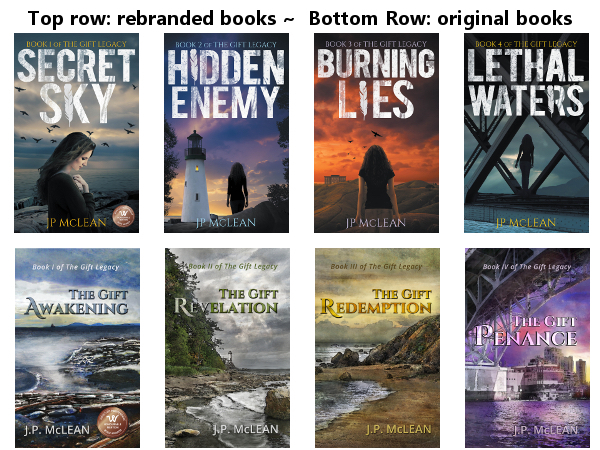by J. P. McLean
As writers, we’re used to getting feedback.
We ask beta readers to take our books for test drives. We ask developmental editors to critique our plots and characters. We ask copy editors to tease out our poor grammar and awkward word choices. We even ask readers for their feedback in the form of reviews.
It’s not always easy to hear this feedback or to sort out which to take to heart and which to set aside.
When Your Book Covers and Titles Don’t Convey the Right Message
When I began writing my Gift Legacy series, there was one piece of feedback I occasionally received that I chose to set aside. But as the books found a wider audience, I heard that same feedback repeated more frequently.
And when I learned both first-hand and through an author friend that readers were passing over my books because of the very feedback I’d set aside, I had to reassess that decision.
The feedback concerned the titles I’d chosen, which were Awakening, Revelation, Redemption and Penance. In hindsight, it’s perfectly obvious these titles might lead a reader to believe the books were spiritual or religious in nature. Their beautiful covers only served to compound the misperception.
The books are, in fact, contemporary fantasy thrillers, but the titles and covers weren’t effectively conveying that information to readers.
With two new books in the series at the final editing stage, I had a choice to make: either continue along the path I’d set, or rebrand the books.
The Argument Against Rebranding: It’s Expensive, Time Consuming, and Difficult
I investigated rebranding, gulped, and promptly rammed my head back into the sand.
New titles meant new ISBNs and new covers, which meant I needed new marketing material and new book stock. And this expense would come on top of the expense I’d just incurred hiring editors and proofreaders for the two new books.
The task of developing new titles, new taglines, new summaries and everything else that goes into branding felt insurmountable. Perhaps the most compelling argument against rebranding was that on some of the retailer platforms, I’d lose the reviews I’d worked so hard to get.
And my inner critic, who spends quality time with the Imposter Syndrome, piled on the doubt and made me question if the books were worth it.
The Argument for Rebranding: It Will Help Readers find the Books
But not rebranding also had a price tag.
Readers would continue to walk away or not find the books at all. What would be the point of writing and publishing books no one reads?
A very wise author friend reminded me that rebranding would attract new readers and new reviews. She then kicked my inner critic in the shins and reminded me of the many glowing reviews the books had received.
So, I set my misgivings aside, took a leap of faith and dove into rebranding the books.
The Work of Rebranding My Books Was Overwhelming
The process has taken me the better part of a year to complete and was much more work than I’d initially thought. It encompassed seven books, my website, my blog and all my social networks. There were days when the sheer volume of work to be done overwhelmed me.
Adding to the stress was the poor Internet service on the small island where I live. Websites would time out before I could upload a file, or in the middle of a critical download.
We don’t have fibre-optic service so have to depend on a satellite dish. Some days I couldn’t connect at all or for hours at a time. On those days the dish would have made a better Frisbee or toboggan and I won’t lie—I was tempted to rip it off the side of the house and test that theory.
Most days I questioned my sanity and more than once I contemplated taking the financial hit and backing out of it.
But I didn’t.

A Writer’s Support System is Critical to Success
The biggest reason I stayed the course was due to the community of writers I’ve gathered like support beams around me.
Some of them know me, some don’t. Some I’ve met in person and others I’ve met only online. But all of them at one point or another have shared their fears and struggles, whether it’s with craft, confidence or convoluted technology.
They remind me I’m not alone. They allow me to vent my frustration. They pick me up, dust me off, and set me back on my path. They encourage me to reach out for support. They tell me to go outside and get some exercise. They advise me to take a step back, regroup, and break impossibly large tasks into manageable smaller ones.
If there’s a takeaway from this experience, it’s how important your support system is.
Family and friends are critical, of course, but reach out to other writers as well. If you can’t meet them in person then find them online. Join a writers’ organization. Follow a blog—Writing and Wellness is a terrific resource. Attend a writers’ conference and introduce yourself.
No matter where you are on your career path, you’ll find a more experienced writer to learn from and a new writer you can help out.
Because that’s what writers do. We share our knowledge and experience. We provide a unique perspective and feedback that you can take to heart.
I’m so grateful for that community that wouldn’t let me give up.
 Rebranding Has Had Great Results So Far
Rebranding Has Had Great Results So Far
Only time will tell how successful the rebrand is, but the books are already finding new readers. The new covers and titles are being well-received and the cover of the first book, Secret Sky, was selected by Kobo Writing Life as one of their top ten covers in the Science Fiction and Fantasy category.
Secret Sky went on to win the top spot in its category for 2018. Not a bad start for a rebrand!
(Read Jo-Anne’s other post on Writing and Wellness here.)
* * *
 J. P. (Jo-Anne) McLean lives and writes on the coast of British Columbia, which is also featured largely in her work. She pens contemporary thrillers with a twist of fantasy. Reviewers call The Gift Legacy series, addictive, smart and fun.
J. P. (Jo-Anne) McLean lives and writes on the coast of British Columbia, which is also featured largely in her work. She pens contemporary thrillers with a twist of fantasy. Reviewers call The Gift Legacy series, addictive, smart and fun.
She and her husband make their home on Denman Island. Jo-Anne is a certified SCUBA diver, who has called the USA, Mexico and Canada home. When she’s not writing, Jo-Anne enjoys gardening, cooking and reading.
For more information on Jo-Anne and her work, please see her website, or connect with her on Facebook and Twitter.


Your post also shows how important it is to get feedback from more than one viewpoint when you’re first developing titles and covers. A long time ago when I had to set up a database (ugh), the advice was to think the whole thing through before I started because it’s very hard to make changes later. Even those writers who meticulously outline can change and revise their work, but anything sent out to the public needs careful planning, which isn’t easy to learn for some of us.
Absolutely! And feedback from readers in the specific genre can be a real eye-opener.
I’ve been calling my work “Young Adult” for the past five years. My writer friends have advised me that I need to rebrand to “Adult” fiction as it goes from age 12 to age 18 of my main character’s life. I am hopeful this will help my book find readers who enjoy this tale. It’s been seven years in the making and I’m nearing the finish line. Thanks for your story of finding the courage to rebrand your series and find success in doing so.
Thanks, Kathy. You’re right–honing in on the right genre is critical to finding your readers. Best of luck as you cross that finish line.
Wow, you rebranded all the way! –Titles, blurbs, and covers. I’ve been down the re-branding road with new cover(s), adding a subtitle to clarify the genre, and website. Your post is encouraging to us making that decision to invest in ourselves as professional writers. Thanks.
I’m glad the post helped, Lisa. Thinking of it as an investment is exactly the right thinking. We may be creatives, but we’re also in business.